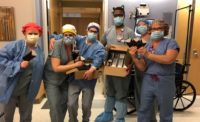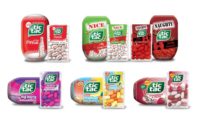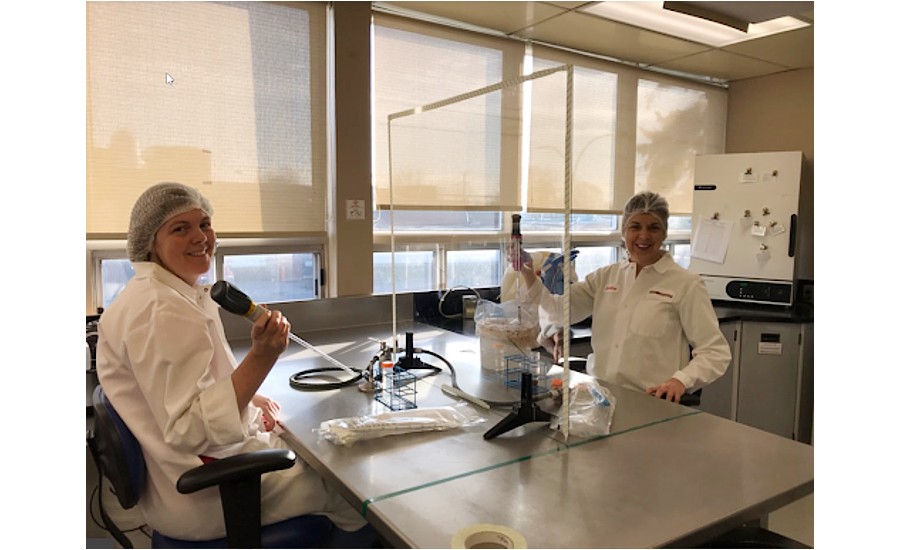How Barry Callebaut Americas is handling the COVID-19 pandemic
Increasing sanitation, dividing production teams among measures taken to enhance safety, maintain production.




With two dozen factories, Chocolate Academy Centers and offices spread across six countries in the Americas, managing employee safety and food safety during the COVID-19 pandemic is no easy feat.
But Barry Callebaut has risen to the task, relying on established protocols and implementing new ones, all while maintaining continuous production, says Stacey Popham, v.p. of quality assurance, Americas, and regional incident management team lead for COVID-19.
Popham, along with other Barry Callebaut representatives, recently spoke to Candy Industry about how the cocoa and chocolate manufacturer has handled the COVID-19 pandemic.
CI: Were there any protocols Barry Callebaut had in place before the pandemic that have been helpful?
SP: We had many protocols already in place to ensure Good Manufacturing Practices, which include protocols such as staying home when you are sick, proper and frequent hand washing, and sanitizing your hands. We also have a strong sanitation protocol to ensure our factories are kept clean — this was instrumental when we started to increase the sanitation schedule of commonly-touched surfaces during COVID-19. Our strong food safety culture of implementing relevant scientific data into our programs, and then auditing for continuing improvement, was a strong foundational element for our success in managing through the pandemic.
CI: Has Barry Callebaut put any new safety protocols into place since the outbreak began? If so, what were they?
SP: Yes, right away, in February when COVID-19 was escalating, we assembled our regional incident management team, aligned with our global team, to develop protocols for our manufacturing sites and for our offices to keep our employees’ health and safety as priority No. 1. We implemented many new protocols in line with or exceeding recommendations from the Centers for Disease Control and World Health Organization. Our first consideration was the safety of our people — we had to address this in a rapidly changing situation. Our care also extended beyond our own employees to outsourced services, such as our security teams and workers from trucking companies who deliver for us.
First, we asked all non-essential employees to stay home to reduce the overall density of the population. For those who had to be in the factory, we divided into Team A/Team B to also reduce density of the population and to ensure segregation. Then, we began wellness screening for anyone who needed to enter one of our sites, which included temperature checking, ensuring no COVID symptoms and confirming there was no risk of close contact to a confirmed COVID case. For those in the factory, we enforced strict social distancing of 6 feet minimum in all areas of the factory.
We communicated these measures to local management teams and posted safety information at critical points throughout our sites to keep our teams informed. When necessary, we installed physical barriers such as plexiglass to maintain self-contained work areas. We increased sanitation of all frequently-touched surfaces in addition to before and after shifts in locker rooms, cafeterias and bathrooms. Finally, we provided and required face masks for all employees to prevent respiratory droplets from spreading. As an overarching protocol, we instituted contact tracing. We developed local incident response teams at each site that did contract tracing on any confirmed case. As we continue through our recovery phase, we are staying vigilant with our teams to ensure they maintain these protocols even as states open up.
CI: Chicago has been one of the country’s hotspots for COVID-19 cases. Has that had an impact on Barry Callebaut’s workforce there?
Angie Kipper, v.p. HR, Americas: Our regional headquarters is located in Chicago and thankfully we have not been impacted. We made the decision very early in March to move to remote work to protect our team members. Our employees pivoted overnight to a work-from-home arrangement with the help of our IT partners. Every department was able to continue normal operations in supporting our business. Being flexible with work schedules and proactive support from managers were the keys to the seamless transition to remote work. We committed to virtually looking out for one another.
CI: How has the pandemic affected operations of the Chocolate Academy Center in Chicago?
SP: Our chefs are able to work in the Chocolate Academy on a staggered basis and are conducting virtual co-creation sessions for new and potential customers each week to maintain a high level of customer service and a steady innovation pipeline.
CI: Did Barry Callebaut suspend production at any point during the pandemic? Or has production been continuous?
SP: No, we did not suspend production at any of our 18 sites throughout the Americas at any point during the pandemic. As an essential part of the food supply chain, we proactively instituted all of our actions to ensure business continuity and to maintain a high level of service to our customers.
CI: Has Barry Callebaut had any trouble getting cocoa or other ingredients during the pandemic?
Fernando Martin del Campo, v.p. of sourcing, Americas: I am proud to say that we have not had any trouble sourcing cocoa or any other ingredients during the pandemic. We have in place a business continuity strategy and visibility process with key suppliers to have the right controls behind the sourcing, freight, inventories and production of our main ingredients to avoid any supply disruption.
Jo Thys, v.p. of cocoa, Africa: In Côte d'Ivoire, there was a curfew commencing at 9 p.m. and ending at 5 a.m., so we had to address the big question — how do we keep sites and factories running as normal? The first step was to reconstitute the shifts to work around the curfew. So our shift and factory colleagues worked together to organize a totally different shift structure, two shifts of 12 hours, without any impact on the output of the factory.
In Ghana, cities such as Accra, Tema and Kumasi were locked down, and we had the situation where key workers, such as our QA colleagues, could not travel from their homes in Accra to Tema. To address this, we took the decision to rent an entire guest house, near our factory in Tema to allow our people stay there safely.
In general, there is less traffic passing through cocoa-growing communities. Less traffic means there is less cash being injected, restaurants and shops are not open. So our teams on the ground have been working very hard to support farmer communities in Côte d'Ivoire, Ghana, Cameroon, Nigeria and Tanzania. For example, we have been buying locally made soap from communities which has provided additional income to farming communities, we have donated hand washing equipment, protective masks, sanitizer kits and partnered with our customers and local governments on COVID-19 preventive measures and hygiene activities.
SP: We did work with farmers through our sustainability programs to educate them about COVID-19 and to help them protect themselves and their families. Barry Callebaut has more boots on the ground than any other cocoa and chocolate company; as a result, we have been able to provide robust grassroots support to our farmers in origin countries by donating bars of soap and masks.
CI: As the country gradually reopens over the coming weeks, will Barry Callebaut make any changes to safety protocols? Has Barry Callebaut begun to resume normal operations?
SP: We are proud that our operations have continued “as normal” throughout the pandemic. This is a testament to our loyal plant workers who have kept up not only the same volume numbers, but also made productivity records during the months of April and May. We have put our people first, which is reflected in our healthy business position now.
For our office staff, while those of us who can work from home are working from home, we have never closed! We have restricted access to non-essential employees in our factories, and there will be a time over the next six months when we gradually allow visitors back in. We will continue all of our escalated health protocols until we have fully exited the pandemic. There will likely be a new normal for all of us, and we are gathering the key learnings that will be leveraged throughout the company once this pandemic ends. This has been a tremendous learning time for us.
There likely will be a moment when checking temperatures of employees in the entrance to a factory may not be necessary or legal anymore, but the focus on handwashing and sanitation has and always will be here to stay! It is embedded into our food safety culture at Barry Callebaut.
CI: Is there anything else you’d like to add?
SP and AK: Our focus throughout this pandemic was very clear: people safety and food safety. We had a very strong incident management team to ensure learnings were quickly cascaded directly to our factory floor. All best practices are shared, and we have consistent programs across all of our factories and distribution centers. Our teams have been incredibly creative during this time.
While we are extremely proud that we have had strong business continuity, we have also upheld in creative ways all of our sustainability and quality systems — whether it be kosher audits or customers we wired virtually to maintain certifications and even gain new customers and business. We also used this opportunity to build engagement between factory and office workers through thank you videos, our #curbsidechallenge to order takeout meals from local restaurants to support them during this difficult time, and keep our plant workers well-fed, and personalized video messages and letters from our Americas’ President Peter Boone to celebrate key milestones and let them know their work is valued and appreciated. We are staying close to our customers and the market through our new digital platform BC LIVE, which launched this week.
COVID-19 has brought us — our nearly 3,500 employees at our 24 chocolate and cocoa factories, distribution centers, Chocolate Academy sites and offices spread over six countries in the Americas — even closer together. This experience that we are going through together has really shown us we are one team with one vision that will come out of this even stronger than before.
Looking for a reprint of this article?
From high-res PDFs to custom plaques, order your copy today!








